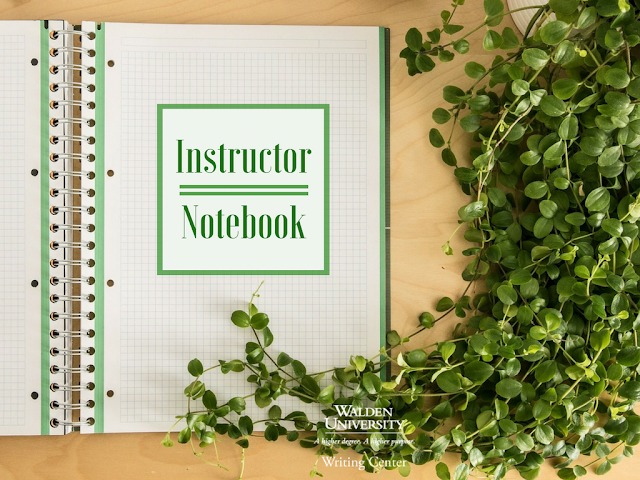Instructor’s Notebook: How I Approach Paper Reviews
Monday, May 29, 2017
Instructor's Notebook
,
Revising
,
Writing Center Services
,
Writing Process
No comments
One of the pedagogical approaches we use during Paper Review
appointments here in the Writing Center is that Instructors don’t comment on
every instance of an issue they identify in a student’s writing. Students sometimes wonder why that is. In today’s
post, I am going to discuss why I don’t comment on every instance of an issue
in a paper review and how this relates to the revision process, information
overload, and helping students with their own revising and proofreading skills.
Writing and writing center pedagogy support the idea of
writing as a process. Writing as a process means a piece of writing undergoes a
series of drafting and revising events. In terms of academic writing, it means
that a strong, well-organized argument from the thesis down to the sentence-level
and everything in between is the result of multiple steps of a process. Therefore, I focus my comments on some, not
all, patterns of error in a paper review to encourage the idea that writing is
a process and requires multiple drafts.
During the drafting process, as students are still
developing their points, there might be several different issues that a student
should address as they revise. However, as an Instructor, I consider where a
student is at and the most pressing writing concerns they might work on for
that particular draft. Since not all concerns are equal within any given writing
project, Instructors must rank them and decide which ones take priority for a
student. The recommendations I make for revising are all part of this drafting
and revising process, a process that is often recursive as a student might revise
the same section multiple times as they develop their argument and
fine-tune their points.
Regardless of my suggestions during a paper review, one of
my overarching goals is to help students understand that revising is a process,
which is part of the reason I don’t comment on every pattern of error in a
paper review.
Information Overload
Another reason I don’t comment on everything in a Paper
Review is because information overload can cloud a student’s comprehension. Information
overload can simply be understood to be given too much information to
effectively process in a given amount of time. Even if it was possible to
process all of the information, the results of the effort would be temporary as
opposed to long-lasting. If I commented on every issue I notice in a Paper Review,
it would lead to information overload because, even if a student was able to
revise based on all of my suggestions, those revisions would likely not be
internalized and transferred to other assignments. Thus, a student would likely
not have gained any lasting writing skills.
Information overload does not lend well to students
developing their own ability to recognize patterns of error and revise their
papers on their own. To be clear, information overload does not provide a
strong basis for recognizing and revising error since it cuts short the
revising process which is essential for developing a strong, well-developed
argument. Therefore, I don’t want to dissuade students from engaging with the
writing process, which can sometimes happen if there is information overload:
yet another reason why I don’t comment on every instance of an issue in a paper.
Revising and Proofreading
Skills
To become strong, independent writers, students to be able
to internalize feedback so they can transfer
writing knowledge from one paper to the next. One method we use to achieve
this goal is helping students learn to revise and proofread on their own. The
more a student is able to work on their papers before and after a paper review,
the more seamless the writing process can become. When students feel more
confident in their ability to revise and proofread, they can feel more
confident in their ability to tackle those longer documents, such as the capstone
project. So, in the end, Writing Instructors want students to develop their own
writing skills so that that process of writing is more pleasant and seamless
for them, and so they are able to express their arguments in ways they feel
confident about. Especially for those final capstone documents and any subsequent
academic publication goals they might have.
Veronica Oliver is a Writing Instructor in the Walden Writing Center. In her spare time she writes fiction, binge watches Netflix, and occasionally makes it to a 6am Bikram Yoga class.
.png)
Never miss a new post; Opt-out at any time
Subscribe to:
Post Comments
(
Atom
)





No comments :
Post a Comment